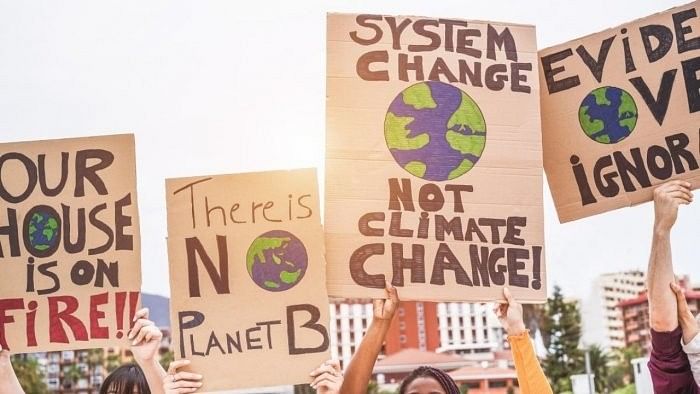
Representative image for climate change.
Credit: iStock Photo
On September 23, 2019, UN Secretary General Antonio Guterres, for the first time, organised the Global Summit on Global Warming, in New York, where the book Combating Global Warming: The Role of Crop Wild Relatives for Food Security, authored by this writer, was launched.
A copy of the book — which discusses in detail the anthropogenic origin of global warming, a primary constituent of which is the unbridled use of fossil fuel-based synthetic fertilisers to prop up the chemically-centric farming, euphemistically called the ‘green revolution’ — was presented to then US President Donald Trump and Primi Minister Narendra Modi, who attended the summit.
Despite increasing extreme weather events and record-shattering global temperatures, greenhouse gas emissions continue to rise and oil and gas companies reap handsome profits.
On September 20, exactly four years after the first summit in New York, Guterres billed the new “Climate Action Summit” as a “no nonsense” forum where leaders or cabinet ministers will announce specific actions that deliver on their commitments under the Paris Agreement.
In his opening speech, he evoked 2023’s “horrendous heat” and “historic fires,” but stressed: “The future is not fixed: It is for leaders like you to write”. Sadly, the hypocrisy of global leaders is reflected by how they are approaching the war on climate control. The following example illustrates one such hypocritical act.
UK Prime Minister Rishi Sunak is preparing to water down some of Britain’s environmental commitments, saying that Britain must fight climate change “without penalising workers and consumers”. Sunak is reportedly considering the extension of the deadline for diesel and petrol-powered cars, set for 2030, to 2035.
However, it is heartening to note that Nitin Gadkari has threatened automakers with a proposal to add an extra 10-15 per cent to the price of diesel-powered cars, but is silent on petrol-powered cars. It is important to note that both diesel-powered and petrol-powered cars contribute to global warming; though the former contributes much more. It is noteworthy that the leaders of the US, India, China and Japan abstained from Wednesday’s meeting.
It is still possible to limit the rise in global temperature to 1.5 degrees. And we can still build a world of clean air, green jobs and affordable clean power for all, but the million-dollar question is: will global leaders stick to their reported commitments on climate control?
The bar for the podium was set high, with the UN chief making clear that only leaders who had made concrete plans to achieve net-zero greenhouse emissions would be allowed to speak.
After receiving more than 100 applications to take part, the UN finally released a list of 41 speakers on Tuesday night,
which did not include China, the US, the UK, Japan or India.
Several major leaders didn’t bother making the trip to New York for this year’s UN General Assembly, including President Xi Jinping of China and Sunak, who said he was too busy.
US President Joe Biden, who addressed the General Assembly on Tuesday, sent his climate envoy John Kerry to the meeting, although Kerry wasn’t permitted to speak in the segment reserved for “movers and doers”, a segment reserved only for the concerned global Heads.
There’s no doubt that the absence of so many leaders from the world’s biggest economies and emitters will clearly have an impact on the outcomes of the summit. Possibly, two reasons can be attributed to their absence: first, the Russian-Ukraine war; second, pressure from the oil lobby.
Catherine Abreu, executive director of nonprofit Destination Zero, said it was “perhaps a good-news story that we see Biden not being given a speaking slot at the summit” because the US is continuing to expand fossil fuel projects even as it makes historic investments in renewables. Yet another example of climate hypocrisy.
“I think about this as being a correction from past summits, where leaders have been given the opportunity to take credit for climate leadership on the global stage, while they continue to pursue plans to develop fossil fuels, and continue driving the climate crisis back at home,” she added.
Broken Promises
The event was the biggest climate summit in New York since 2019, when Greta Thunberg, the teen climate activist from Sweden, who rowed her way from Sweden to New York rather than take a flight, stunned the world with her “how dare you” speech before the UN.Anger is building among climate activists, particularly younger people, who turned out in thousands last weekend for the “March to End Fossil Fuels” in New York.
Observers are eager, however, to see what Canadian Prime Minister Justin Trudeau and European Union President Ursula von der Leyen say, both on their own goals and on financing commitments for the developing world.
Advanced economies vowed in 2009 to channel $100 billion to less developed countries by the year 2020 — a promise that was broken — even as much of the funding that was mobilised came in the form of loans.
Meanwhile, a “loss and damage” fund aimed at providing financial assistance to nations most vulnerable and impacted by the effects of climate change has still not been operationalised.
However, there are some bright spots, including the announcement that Colombia and Panama are joining a grouping called the ‘Powering Past Coal Alliance’ (particularly notable as Colombia is the world’s sixth biggest coal exporter). Both India and China, huge coal producers, must take a cue from this.
(The author is former Professor, The Royal Society, Belgium)